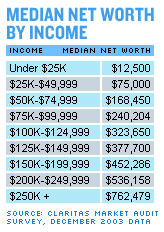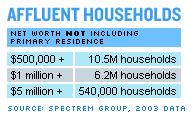NEW YORK (CNN/Money) � Even if you're a navigational genius, it's hard to figure out how to get somewhere when you don't know where you are.
That, in a nutshell, is one of the most compelling reasons to periodically estimate your net worth, which is a measure of your assets minus your liabilities.
Figuring out your net worth is key to creating a comprehensive financial plan and provides a good measure of whether you're making progress financially.
No matter what your "number" is today, the goal is to have it increase over time, at least until you hit retirement (when you may begin to spend down some of your assets).
If nothing else, performing a net worth calculation can be a motivating factor. You may think, for instance, that you're doing fine on savings until you realize that your non-mortgage debts all but erase or exceed them.
"Just because your assets are going up doesn't mean your net worth is going up," said certified financial planner Steven Kaye, who is president of the American Economic Planning Group.

Now, that's not an unreasonable � or uncommon � situation for, say, a new college graduate in her first job when she's just begun to pay off student loans. But it's hardly ideal for someone in her 40s who's been working for years.
Nearly 31 percent of U.S. households have a net worth below $25,000, according to market research firm Claritas. Of those, nearly 11 percent have a negative net worth.
The median net worth of all U.S. households, meanwhile, is $100,894, meaning half of all homes have less.
On the high end, only 11.4 percent of U.S. households have a net worth of $500,000 or more.
Measure with perspective
To calculate your net worth, first tally up the value of your assets. That includes your checking, savings, brokerage and retirement accounts. It also includes your home(s) and any art, antiques or other collectibles that you plan to sell at some point.

Realistically, unless you need to value your assets for insurance, estate or liquidation purposes, you probably shouldn't count the family jewels. "Forget about your jewelry," Kaye said. "You're not going to sell it. You're going to give it to your daughter."
Likewise, what's the point of counting the couch in your den, unless you really plan to sell it and nap standing up for the rest of your life?
Lastly, you can count money owed to you but not yet paid so long as there's a high probability of collection, Kaye said. Include loan receivables, bonuses or deferred compensation.
On the liability side, count all your debts � such as your mortgage, student loan, car loan or home equity loans; plus any balances on credit cards or lines of credit.
What's your net worth really worth?
For a more fine-tuned version of your net worth, don't just think gross value, Kaye advised. Consider how much you'll actually pocket from those assets and how much of your net worth is tied up in assets that aren't very liquid.

In other words, he said, ask yourself "what's the real net value when you convert it to cash?"
For instance, say you bought a stock for $10,000 and now it's worth $25,000. You may think it's a $25,000 asset, but in reality you're going to end up paying capital gains tax on that amount, so subtract that amount from the total.
Likewise, when assessing how much of your net worth is in your home, consider two factors besides current market value and the amount remaining on your mortgage.
The first is capital gains tax and realty fees. You get to keep $250,000 in gains tax-free if you're single; or $500,000 if you're married. Any gains beyond that, and Uncle Sam will want his share.
| RELATED ARTICLES
|

|
|
|
|
Plus, you may pay 6 percent of the sale price to a real estate agent, a realty transfer fee and moving costs.
Second, remember your home is a "use asset," Kaye said. That is, you'll always need a place to live. So if you plan to sell your current house, will you downsize to a less expensive home and pocket some of the gains? Or will you transfer all money from the sale into a new home?
If you don't plan to downsize, you may want your "working assets" such as your easy-to-liquidate investments to account for a bigger piece of your net worth pie.
Keep in mind, too, your net worth will be different depending on whether you're measuring it for your own purposes or for your heirs' purposes, Kaye said.
Say you have a life insurance policy with a cash value option if you wish to tap it. That's likely to be worth far less to you than the policy is to your heirs after you die. "It's net worth to them. It's worth nothing to you," Kaye said.
For help estimating your net worth, try CNNMoney's net worth calculator.

|

